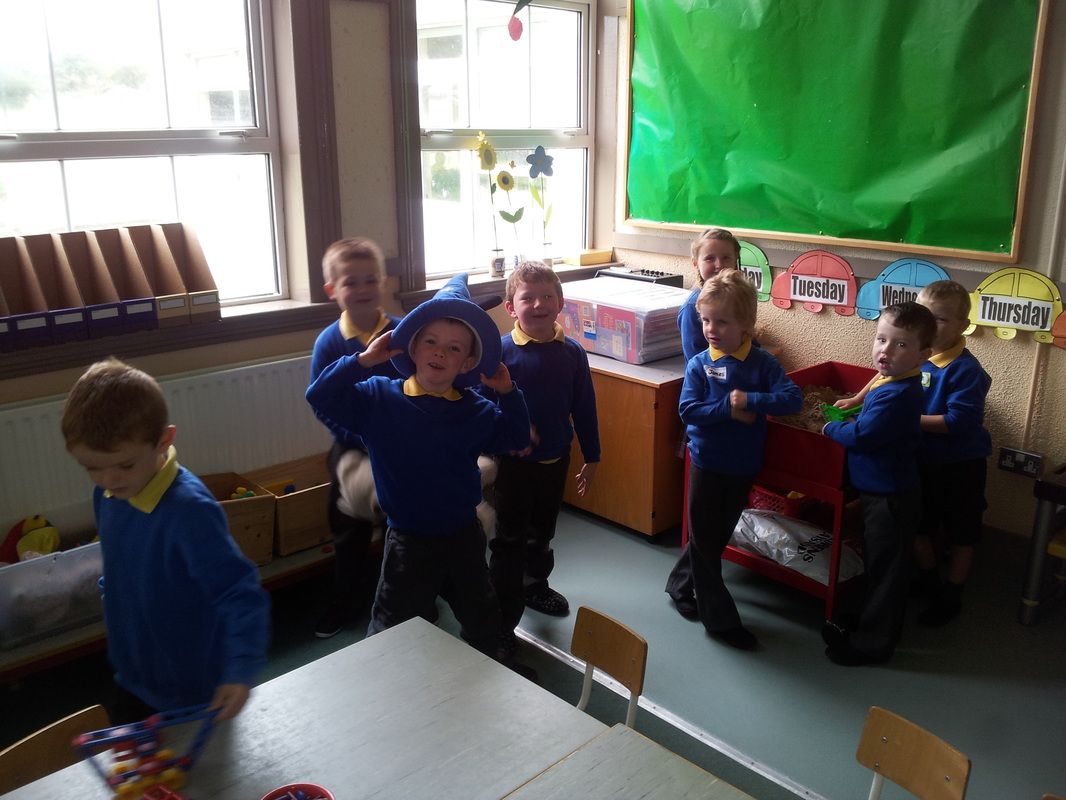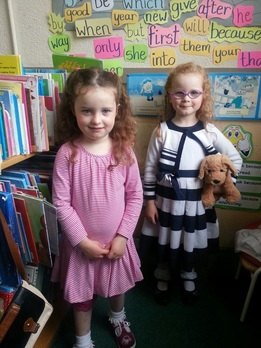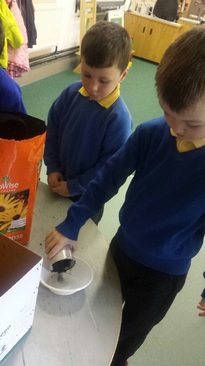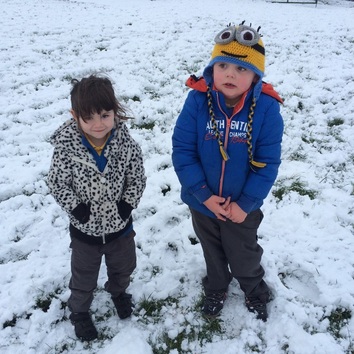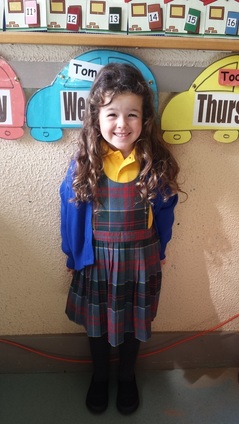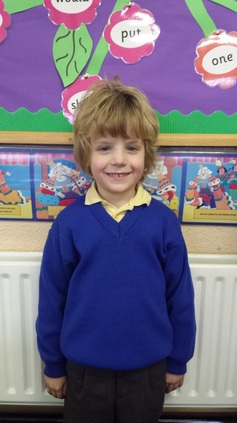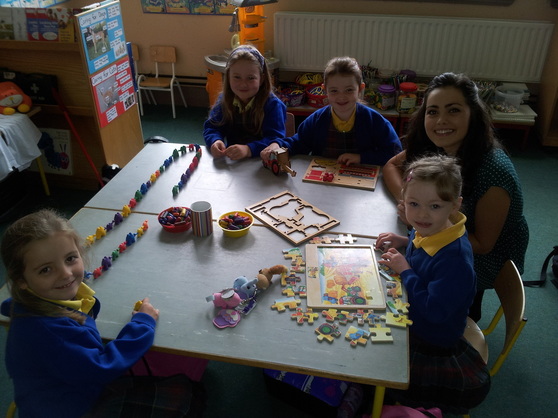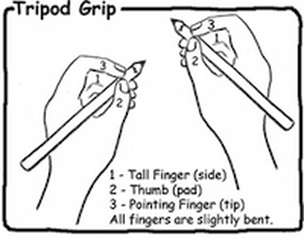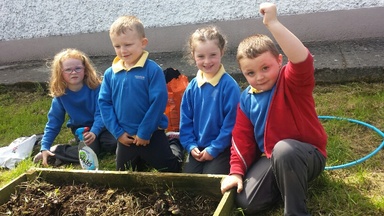Information for New Junior Infants
Helpful Information for Parents of Children Starting School
Starting school will be the first big change in the life of your child. Up to this they have felt safe and secure with you in the home and family but now they are facing the wider world of classroom and school. This may seem a big step for someone so small but most children manage it without any great fuss or stress - and in fact take to it like ducks to water.
It is important that the transition from home to school is as smooth as possible. If the child’s first experience of school is one of happy involvement, a very good foundation will have been laid for fruitful school years ahead. We know from experience that parents are very anxious to help in any way possible. We have, therefore, included some ideas for the home, which should stimulate the child’s interest and nurture their desire to know more.
It is important that the transition from home to school is as smooth as possible. If the child’s first experience of school is one of happy involvement, a very good foundation will have been laid for fruitful school years ahead. We know from experience that parents are very anxious to help in any way possible. We have, therefore, included some ideas for the home, which should stimulate the child’s interest and nurture their desire to know more.
Before Your Child Starts School
You should ensure that your child is as independent as possible - physically, emotionally and socially. If they can look after themselves in these areas they will feel secure and confident and settle in readily.
It would help greatly if they were able to-
It would help greatly if they were able to-
- Zip and unzip their coat and hang it up.
- Use the toilet without help and manage pants buttons / zip.
- Also encourage personal hygiene and cleanliness. Your child should know to flush the toilet and wash their hands.
- Use a tissue when necessary and be able to blow their nose independently.
- Share toys and play things with others and “take turns”.
- Tidy up and put away their play things.
- Be able to put on and take off their shoes. Velcro shoes are recommended for the first year until your child has mastered lace tying.
Getting Ready to Learn
Children are natural learners. They have an innate curiosity and an eagerness to know more about everything – about themselves, about others and about the world around them. And they learn fast – but only when they are ready and their interest is aroused.
Because they come to us so young, we must guard against putting pressure on them to learn what they are not yet ready for. Demanding too much too soon can switch a child off completely. At the same time we must cultivate readiness so that they can progress as soon as possible.
The rates of progress of children can vary greatly. We try to give them an opportunity to move ahead at their own pace or as near to it as possible.
Our first year in school, therefore, is mainly about settling in, relating to others, making friends, feeling happy and gradually getting used to the routine of the school. On the learning side the emphasis is on getting children ready for learning by –
Because they come to us so young, we must guard against putting pressure on them to learn what they are not yet ready for. Demanding too much too soon can switch a child off completely. At the same time we must cultivate readiness so that they can progress as soon as possible.
The rates of progress of children can vary greatly. We try to give them an opportunity to move ahead at their own pace or as near to it as possible.
Our first year in school, therefore, is mainly about settling in, relating to others, making friends, feeling happy and gradually getting used to the routine of the school. On the learning side the emphasis is on getting children ready for learning by –
- Developing their oral language and expression.
- Sharpening their senses, especially seeing, hearing and listening
- Developing physical co-ordination especially of hand and fingers.
- Extending their concentration span and getting them to listen attentively.
- Learning through play – the most enjoyable and effective way.
- Co-operating with the teacher and other children.
- Performing tasks by themselves.
- Working with others and sharing with them.
- Getting each child to accept the general order, which is necessary for the class to work well.
Preparing for the "Big Day"
The child’s first day at school is a day to remember for the rest of their life. You can help to make it a really happy one for them.
- Tell him/her about school beforehand, casually, and talk about it as a happy place where there will be a big welcome for him and he will meet new friends.
- Don’t use school or the teacher as a threat. “If you behave like that for teacher she’ll be cross with you” though said light-heartedly can make some children very apprehensive.
- Remind them about the Teddy Bears Picnic and the friends that they made and they toys they played with. This will get them excited about returning to school and give them positive memories of their visit day.
- Children will be very proud to have their new uniform and new bag when they begin. These help the children identify more readily with the school and other children.
- Please ensure that coats, hats, gloves, Jumpers and tracksuits are clearly labelled with your child’s name.
- The teacher will hold on to your child’s books until such time as they are needed. This minimises the chances of books getting lost. All books/copies should be marked with your child’s name.
- All children are asked to bring slippers to school on the first day also as we wear slippers on the carpet during the school day and we change our shoes going outside to keep the carpet clean and so we can be more comfortable while we work. All slipper types are allowed but Black Canvas Slippers (available in Anne Coffey's in Kilcormac) and Crocs are more durable for day to day wear in comparison to fabric slippers.
The Big Day - First day at school
Coming in: When you arrive at the classroom, be as casual as you can. Your child will meet the teacher and the other children and will be invited sit in their seat. Hopefully they will be happy in their new surroundings. So, having assured your child that you will be back to collect them later on at 12, wish him/her goodbye and make your getaway without delay.
Packed Lunches:
Lunch is an important meal for school-going children. The traditional packed lunch of milk and sandwiches is under attack from a range of convenience foods like crisps, sweets, biscuits, chocolate and soft drinks. Parents and teachers are concerned about this trend and we ask you to encourage a healthy lunch right from the start.
We have a healthy eating policy in our school. Therefore, children are expected to bring healthy lunches everyday to school, below are links with tips for creating healthy lunches for your children and proper portion sizes.
Packed Lunches:
Lunch is an important meal for school-going children. The traditional packed lunch of milk and sandwiches is under attack from a range of convenience foods like crisps, sweets, biscuits, chocolate and soft drinks. Parents and teachers are concerned about this trend and we ask you to encourage a healthy lunch right from the start.
We have a healthy eating policy in our school. Therefore, children are expected to bring healthy lunches everyday to school, below are links with tips for creating healthy lunches for your children and proper portion sizes.
Start with the Basics:
A healthy packed lunch should contain bread or an alternative, a savoury filling which provides protein, a suitable drink (water) and some fruit and/or vegetables.
A Word about Drinks:
Children may bring in their own water, fruit drink or milk. Fizzy drinks are not allowed.
Going Home:
For the first 3 weeks of September Junior Infants will be collected at 12 o'clock each day. This is to ensure that your children are eased into school as it tends to be a very tiring experience.
Be sure to collect him on time. Children can become very upset if they feel they are forgotten.
We ask parents to stay at the school gate, the children will come out to the school door and will be sent down to parents as they arrive. The teacher will tell the children to go when their parent/child minder is there to collect them, please don't call or beckon your child. This method ensures that all the children are collected safely and no child goes past the school gate unsupervised.
If at any time the collecting routine has to be changed please ensure you tell the child and write a note or call the school and inform the class teacher.
A healthy packed lunch should contain bread or an alternative, a savoury filling which provides protein, a suitable drink (water) and some fruit and/or vegetables.
A Word about Drinks:
Children may bring in their own water, fruit drink or milk. Fizzy drinks are not allowed.
Going Home:
For the first 3 weeks of September Junior Infants will be collected at 12 o'clock each day. This is to ensure that your children are eased into school as it tends to be a very tiring experience.
Be sure to collect him on time. Children can become very upset if they feel they are forgotten.
We ask parents to stay at the school gate, the children will come out to the school door and will be sent down to parents as they arrive. The teacher will tell the children to go when their parent/child minder is there to collect them, please don't call or beckon your child. This method ensures that all the children are collected safely and no child goes past the school gate unsupervised.
If at any time the collecting routine has to be changed please ensure you tell the child and write a note or call the school and inform the class teacher.
Handling an Upset Child
In spite of the best efforts of both teacher and parents a small number of children can still sometimes become upset. If your child happens to be one of them don’t panic. Patience and perseverance can work wonders.
A Word of Advice
A Word of Advice
- Trust the teacher. She is experienced and resourceful and is used to coping with all kinds of starting –off problems.
- Try not to show any outward signs of your own distress. Sometimes the parents are more upset than the child and are the main cause of their anxiety. Children are very intuitive and can pick up on their parents nervousness so try remain calm and positive about school.
- When you have reassured them and they are being distracted by the class teacher, leave as fast as possible. The teacher can distract and humor him/her more easily when you are not around.
- If you wish you can check back discreetly in a short while, by calling the school. You will invariably find that calm has been restored.
- You must be firm from the start. Even if a child is upset you must insist that they stay for a short time. He/she must never feel that he is winning the psychological battle of wills.
As Time Goes on…
School begins at 9.20am. To ease the child into the school routine we have a policy where Junior Infants go home for the first three weeks at 12.00pm. (so no big lunch). After that they go home at 2pm with the Senior Infants.
Small break: 11am to 11.15am
Big Lunch: 12.30pm to 1pm
Children need plenty of rest after the effort and excitement of a day at school. You should ensure that they get to bed early and have a good night’s sleep.
If your child's progress is slow do not compare them adversely with other children while he is listening. Children mature and develop differently at this early stage. Loss of self-esteem can be very damaging to them. If you have concerns, discuss it with the class teacher and they can keep on eye on the areas concerning you or create some additional work that you can be doing at home to encourage your child's progress.
Your child is not going to be a model of perfection all the time-thankfully. You should try to have patience with their shortcomings and praise all of their achievements, no matter how small.
Children often “forget” or relay messages incorrectly, so please, check your child’s homework folder for notes or sometimes notes can be sent by email or text-a-parent.
You will received a book-list outlining the books and other bits and pieces your child will need for the year. Some books are available to rent for a small fee from the book rental scheme. Parents will also be asked to make a small contribution to the school for photocopying and resources.
School begins at 9.20am. To ease the child into the school routine we have a policy where Junior Infants go home for the first three weeks at 12.00pm. (so no big lunch). After that they go home at 2pm with the Senior Infants.
Small break: 11am to 11.15am
Big Lunch: 12.30pm to 1pm
Children need plenty of rest after the effort and excitement of a day at school. You should ensure that they get to bed early and have a good night’s sleep.
If your child's progress is slow do not compare them adversely with other children while he is listening. Children mature and develop differently at this early stage. Loss of self-esteem can be very damaging to them. If you have concerns, discuss it with the class teacher and they can keep on eye on the areas concerning you or create some additional work that you can be doing at home to encourage your child's progress.
Your child is not going to be a model of perfection all the time-thankfully. You should try to have patience with their shortcomings and praise all of their achievements, no matter how small.
Children often “forget” or relay messages incorrectly, so please, check your child’s homework folder for notes or sometimes notes can be sent by email or text-a-parent.
You will received a book-list outlining the books and other bits and pieces your child will need for the year. Some books are available to rent for a small fee from the book rental scheme. Parents will also be asked to make a small contribution to the school for photocopying and resources.
Important Areas of Early Learning
It is important that the child’s ability to talk is as advanced as possible. It is through speech that children communicate their thoughts and feelings, needs and desires, curiosity and wonder.
If they cannot express these in words he/she will tend to remain silent and will often withdraw from the learning activity of the class. That is why a lot of attention is given to language development in the first years of school.
You Can Help….
First Steps in Reading
Ability to read is the foundation for all future progress in our school system. However, learning to read is a gradual process and a lot of preparatory work must be done before a child is introduced to their first reader.We very deliberately do not rush or push children into reading. We get them ready for it over an extended period. Reading is something to be enjoyed. It should never start as a chore for the small child.
You can Help.
Understanding Maths
Maths for the small child has nothing to do with “sums” or figures or tables or adding and subtracting. These will all come much later. Maths is really an introduction to the language they use in understanding and talking about certain things in his daily experience e.g.
· He associates certain numbers with particular things – two hands, four wheels, five fingers etc.
· Counting – one, two, three, four, etc.
· Colours – black, white, red, green, etc.
· Prepositions (telling position) and their opposites: over/under, before/after, inside/outside etc.
· Matching/Sorting – objects of the same size/colour/texture/shape etc.
· Odd One Out – difference in size/colour etc.
Understanding of these concepts comes very quickly for some children. For others it takes a long time. Be patient. You cannot force Maths understanding on a child.
But You Can Help…
In the course of your ordinary daily routine in the home, in the shop, in the neighbourhood you should use suitable opportunities to casually introduce the maths vocabulary referred to above. E.g. How many cakes? The glass is full/empty. We turn left at the lights.
The child gets to understand Maths best by handling and investigating and using real objects. This has been the natural method of learning since they were a baby.
Gaeilge
All children enjoy learning another language besides their own language. They have no difficulty in picking it up because it fascinates them as another code of communication.
They are free of any hang-ups about Irish unless they become aware that the home attitude towards it is not good. So please be careful that anything you say does not give a negative attitude to your child.
We would want parents to give every encouragement and help to the small ones in their efforts to acquire Irish. If they learn new words in school encourage them to use them at home. Use little Irish phrases or words now and again.
Children are delighted to find out that their parents know their new found language as well. If they must learn Irish, let them enjoy it and master it to the best of their ability.
Getting Ready For Writing
Making letters on paper is not easy for the small child. He/she must learn to hold the pencil properly and make regular shapes. His/her hand and finger muscles are only gradually developing at this stage.
Encouraging a tripod grip is very important for developing a flow of writing.
You Can Help…
He must develop the ability to get the hand and eye working together. This is very important. Get him to manipulate toys like:
It is asked that parents do not start letter formation with children before they come to school because it can be hard to break incorrect habits that children have developed when forming letters. It is better that children come to school and learn the formation of letters along with their classmates.
When your child begins to use a pencil make sure that they hold it correctly from the start. It will be more difficult to correct the grip later.
If they cannot express these in words he/she will tend to remain silent and will often withdraw from the learning activity of the class. That is why a lot of attention is given to language development in the first years of school.
You Can Help….
- Talk to your child naturally and casually about things of interest that you or things they may be doing-at home, in the shop, in the car, etc. Remember that they are constantly absorbing the language they hear around them. It takes children a while to make language their own and to use it for their own needs.
- Try to make time to listen when he/she wants to tell you something that is important to them. But don’t always make them the centre of attention.
- If your child has trouble with certain letter sounds encourage them to say the sound properly when you hear them mispronouncing the certain words. Show them how your mouth forms the sound and exaggerate the motion. Encourage your child to form the sound with their mouth copying you 3 times and praise their effort.
- Answer their genuine questions with patience and in an adequate way. Always nurture their sense of curiosity and wonder.
- Introduce them gently to the ideas of why? How? When? Where? If? etc. These demand more advanced language structures.
- Your child will have their own particular favourite stories that they never tire of hearing. Repeat them over and over again and gradually get them to tell them to you.
First Steps in Reading
Ability to read is the foundation for all future progress in our school system. However, learning to read is a gradual process and a lot of preparatory work must be done before a child is introduced to their first reader.We very deliberately do not rush or push children into reading. We get them ready for it over an extended period. Reading is something to be enjoyed. It should never start as a chore for the small child.
You can Help.
- Have attractive colourful books in the home.
- Read your child a variety of stories from time to time. They will get to associate these wonderful tales with books and reading.
- Reading a book to your child every night is a great routine to begin. Not only is it beneficial for their language and phonics/word recognition but it also fosters a love of reading and associates reading with a special 'me' time with Mammy or Daddy.
- You must convey gradually that books are precious things. They must be minded and handled carefully and put away safely.
- Look at the pictures with your child and talk to them about what they say.
- Read nursery rhymes. Learn them off if you can as you go along. Don’t try to push them.
- Nursery Rhymes, Songs and Poems on CDs are great to have in the car while you are on a journey and children soon learn the words of these well known rhymes off by heart.
- Above all, don’t force your child with early reading. We don't want them to have a negative feeling towards reading and learning
- Sing the alphabet song with your child, so that he at has at least heard of the letters. If he knows what each one looks like, all the better.
Understanding Maths
Maths for the small child has nothing to do with “sums” or figures or tables or adding and subtracting. These will all come much later. Maths is really an introduction to the language they use in understanding and talking about certain things in his daily experience e.g.
· He associates certain numbers with particular things – two hands, four wheels, five fingers etc.
· Counting – one, two, three, four, etc.
· Colours – black, white, red, green, etc.
· Prepositions (telling position) and their opposites: over/under, before/after, inside/outside etc.
· Matching/Sorting – objects of the same size/colour/texture/shape etc.
· Odd One Out – difference in size/colour etc.
Understanding of these concepts comes very quickly for some children. For others it takes a long time. Be patient. You cannot force Maths understanding on a child.
But You Can Help…
In the course of your ordinary daily routine in the home, in the shop, in the neighbourhood you should use suitable opportunities to casually introduce the maths vocabulary referred to above. E.g. How many cakes? The glass is full/empty. We turn left at the lights.
The child gets to understand Maths best by handling and investigating and using real objects. This has been the natural method of learning since they were a baby.
Gaeilge
All children enjoy learning another language besides their own language. They have no difficulty in picking it up because it fascinates them as another code of communication.
They are free of any hang-ups about Irish unless they become aware that the home attitude towards it is not good. So please be careful that anything you say does not give a negative attitude to your child.
We would want parents to give every encouragement and help to the small ones in their efforts to acquire Irish. If they learn new words in school encourage them to use them at home. Use little Irish phrases or words now and again.
Children are delighted to find out that their parents know their new found language as well. If they must learn Irish, let them enjoy it and master it to the best of their ability.
Getting Ready For Writing
Making letters on paper is not easy for the small child. He/she must learn to hold the pencil properly and make regular shapes. His/her hand and finger muscles are only gradually developing at this stage.
Encouraging a tripod grip is very important for developing a flow of writing.
You Can Help…
He must develop the ability to get the hand and eye working together. This is very important. Get him to manipulate toys like:
- Jigsaws, Lego, beads to thread etc
- Plasticine (Marla) to make his own shapes
- A colouring book and thick crayons
- Sheets of paper, which he can cut with a safe scissors
It is asked that parents do not start letter formation with children before they come to school because it can be hard to break incorrect habits that children have developed when forming letters. It is better that children come to school and learn the formation of letters along with their classmates.
When your child begins to use a pencil make sure that they hold it correctly from the start. It will be more difficult to correct the grip later.
Don’t discourage left-handedness. If that is his/her definite natural inclination, don’t attempt to change your child. If you think that your child may be left handed talk to the class teacher and she can arrange to do some hand dominance tests with your child to ensure what hand is your child's strong hand.
Other Areas of the Curriculum
The child in Junior Infants learns a lot through many other activities, which do not need any elaboration here. The child's general development is enhanced through Art & Craft, P.E., Music, Nature and of course through Religious Education.
In regard to the last area, your child's moral and social aspects are covered right through the school day e.g. kindness to others, sharing with them, saying we are sorry, being aware of God through the beauty of nature etc. and in the SPHE subject on the curriculum.
The children learn their prayers gradually. Again, as in the other areas we referred to earlier, the child will benefit from practicing at home what they have learned at school. They can then make their own contribution to the usual family prayers.
Social skills are very important. We encourage good manners at all times, please/thank you, addressing teachers properly, being courteous to fellow students and teachers.
Other Areas of the Curriculum
The child in Junior Infants learns a lot through many other activities, which do not need any elaboration here. The child's general development is enhanced through Art & Craft, P.E., Music, Nature and of course through Religious Education.
In regard to the last area, your child's moral and social aspects are covered right through the school day e.g. kindness to others, sharing with them, saying we are sorry, being aware of God through the beauty of nature etc. and in the SPHE subject on the curriculum.
The children learn their prayers gradually. Again, as in the other areas we referred to earlier, the child will benefit from practicing at home what they have learned at school. They can then make their own contribution to the usual family prayers.
Social skills are very important. We encourage good manners at all times, please/thank you, addressing teachers properly, being courteous to fellow students and teachers.
Final Thoughts
Getting used to School:
Bit by bit the child will get used to the general discipline of the classroom. He will get to understand very quickly that in certain important matters an instruction from the teacher must be obeyed promptly and without question.
Teacher and Parent:
At the early stages some parents meet the teacher almost daily and this is a very desirable thing. However, if there is something in particular that you would like to discuss you can arrange to meet her at a time when you both can have a little peace and quiet. Call the school to arrange a meeting or send a note into teacher in your child's homework folder to arrange a time.
Easy Does It
There are lots of ideas and suggestions in this piece as to how you can help your child. We are not advocating that you do ALL of these with them in a systematic way. But if you find from time to time that your child enjoys a fun approach to certain aspects of learning then we would say – give it a go – but remember don’t overdo it.
Our Hope
We are offering this Guide to Parents as a little practical help in dealing with the education of their children at the very early stages. We will be very happy if you dip into it from time to time and find something in it of value to you and your child. Our hope is that when teaching staff and parents can work together we can optimize children's holistic, educational, emotional, social and cognitive development.
Bit by bit the child will get used to the general discipline of the classroom. He will get to understand very quickly that in certain important matters an instruction from the teacher must be obeyed promptly and without question.
Teacher and Parent:
At the early stages some parents meet the teacher almost daily and this is a very desirable thing. However, if there is something in particular that you would like to discuss you can arrange to meet her at a time when you both can have a little peace and quiet. Call the school to arrange a meeting or send a note into teacher in your child's homework folder to arrange a time.
Easy Does It
There are lots of ideas and suggestions in this piece as to how you can help your child. We are not advocating that you do ALL of these with them in a systematic way. But if you find from time to time that your child enjoys a fun approach to certain aspects of learning then we would say – give it a go – but remember don’t overdo it.
Our Hope
We are offering this Guide to Parents as a little practical help in dealing with the education of their children at the very early stages. We will be very happy if you dip into it from time to time and find something in it of value to you and your child. Our hope is that when teaching staff and parents can work together we can optimize children's holistic, educational, emotional, social and cognitive development.
